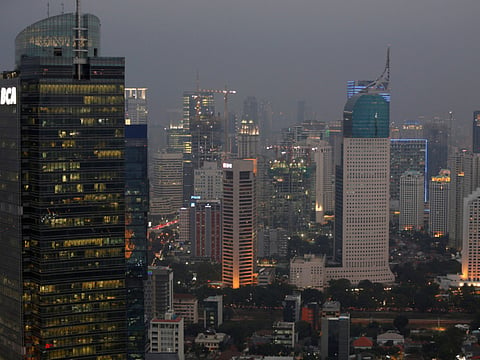Indonesia: Ripe for foreign investment
New property rules should boost the sector; retail, infrastructure also hold promise

Indonesia’s property market is entering a new chapter with several policy changes under the administration of President Joko Widodo aimed at boosting the sector, including relaxed FDI rules and a tax amnesty. The infrastructure and retail markets also offer big investment opportunities.
AT Kearney’s 2016 Global Retail Development Index ranks Indonesia as the fifth most-attractive market for retail investment in the world. The report states that the country’s large population, growing internet penetration and bustling cities make it an attractive market for foreign retailers.
In addition, the rising middle class fuels 10 to 14 per cent annual growth in the sector, which is currently estimated to generate revenues of $324 billion annually. This entices foreign retail investments, among them Abu Dhabi-based LuLu, which opened its first hypermarket in Indonesia in June.
The brand plans total investments of $500 million for hypermarkets, a warehouse and even its own farming operations in the country. “We plan to open ten hypermarkets by the end of 2017, and a central logistics and warehousing facility in Jakarta,” Yusuff Ali M.A., Chairman of LuLu Group, tells GN Focus.
“These projects are likely to generate more than 5,000 job opportunities for Indonesians.”
Building on infrastructure
Infrastructure also offers investment opportunities given the undersupply of roads, railways, airports, ports and utilities. Increased public spending, loans from international bodies such as the Asian Development Bank and new public-private-partnership programmes should boost the sector, which also wants to switch its funding vehicles from conventional loans to sukuk and other Islamic finance instruments.
Overall, Indonesia needs to spend $500 billion over the next five years to build roads, railways and power plants, and the state budget is only capable of contributing 30 per cent, meaning that a large number of sukuk issuances can be expected.
This would be an ideal investment particularly for Gulf investors, given that the Indonesian government is considering cutting taxes to zero for all local-currency sovereign bonds — from 15 per cent for domestic investors and 20 per cent for foreigners.
“With such infrastructure sukuk, Indonesia offers great returns for investors chasing yield,” said Fakrizzaki Ghazali, an analyst at Kuala Lumpur-based RHB Research Institute.
Property market set to boom
While foreigners are currently banned from owning property in Indonesia, Widodo in his presidential campaign last year hinted towards his openness to relaxing this law, thereby augmenting state coffers through taxation. According to reports, Finance Minister Bambang Brodjonegoro is currently reviewing plans to this effect.
The proposal limits foreigners to luxury apartments — as opposed to landed houses — in the bigger cities, worth at least 5 billion Rupiah (about Dh1.37 million).
“This is a good opportunity for Indonesia to attract foreign investors,” said Luhut Pandjaitan, Coordinating Minister for Political, Legal and Security Affairs.
Sofyan Djalil, Coordinating Minister for Economic Affairs, added that there might be other conditions, including size restrictions.
Tax amnesty
The government is also offering citizens with hidden assets abroad a one-time blanket pardon, as well as discounts for tax evaders who come clean. In particular, Indonesia will impose a flat tax between two and five per cent for assets returned by March 2017 in return for a pardon for past evasions. The money must be kept in Indonesia for three years and can be invested in several ways, including direct purchases of property.
At least $30 billion (about Dh110 billon) is expected to flow back into the country — mainly from Singapore.
“This brings positive momentum for us, and we will take advantage of as maximally as we can,” Archied Noto Pradono, Executive Director of Intiland Development, one of the largest property developers in Greater Jakarta, said last month at a press conference in the Indonesian capital where the company presented its new marketing slogan, “Properti untuk tax amnesty” — “Buy property with tax amnesty.”
Apart from Intiland, the new rules will mainly benefit developers of high-rise condominium projects, including Lippo Karawaci, Lippo Cikarang, Agung Podomoro Land and Ciputra Property, according to a June report by RHB OSK Securities Indonesia.
The market was further stimulated by a reduction of the property transfer fee from five per cent to one per cent, and by an easing of minimum mortgage down payments from 30 per cent of the property price to 20 per cent.
“These are great moves,” says James Taylor, JLL’s Head of Research in Indonesia. “It opens up real estate investment, allow local property companies to access the equities market, increase cash flows, enable foreign investors to enter the market without having to navigate complex ownership rights and offer good liquidity in the market.”
Location, location, location
As for the best locations to buy property in Indonesia, brokers name Jakarta, Surabaya and Bali first.
“For Jakarta in particular, it’s a time of rapid change,” says Taylor. “The city’s middle class continues to expand, which carries big implications for the growth of the retail sector, and the demand and supply of different kinds of space.”
He adds that “low costs and huge consumer demand are giving Jakarta the edge — attributes that transnational firms find appealing as they expand their operations in Southeast Asia”.
Furthermore, a new and eagerly awaited mass rapid transit system is slated for completion by 2018.
Surabaya, in turn, is the second-largest business city, with commerce as its biggest market.
“Sales activity of apartment remained stable in Surabaya in the first half of the year,” says Ferry Salanto, Senior Associate Director of Colliers Indonesia. “From now on we predict prices will remain relatively stable through the end of 2016, which will result in a six- to eight-per cent growth year-on-year.”
Experts note that there is also a huge opportunity for property developers in Indonesia. The housing backlog (springing from domestic demand) stands at around 15 million units, according to the central statistics agency.



